Err2
New member
I'll be getting another DXA scan tomorrow to check against my at home body fat estimates (and to compare against the January & October scans). I do expect to see some loss in lean mass this time (a category that includes blood volume, water weight, etc), but I'm really hoping to see zero loss in skeletal muscle mass (which was 84.8 lb in October and 84.7 lb in January).
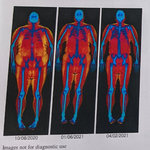
I'm pleased to report that while I did lose almost 2 lb of lean mass I actually gained 2 lb of skeletal muscle mass (mostly in my arms). My overall body fat % came in at 21.0% which is a little under my at home estimates (like it was last time as well). 21% body fat puts me in the top 34% of men my age which is surprising considering I was in the bottom 1% just 6 months ago... Of course being in the top 34% is a dubious honor in a country where 90% of men are overfat.
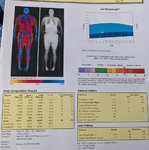
The trends are pretty much all going in the right directions:
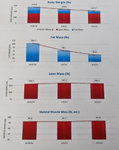
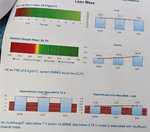
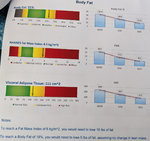
I need to lose 5 lbs of fat to be in a healthy body fat percentage, but lose 16 lbs of fat to reach a healthy fat mass index. Fat mass index is the more accurate measure, imo. Still, visceral adipose tissue - the unseen fat around your organs - is what really matters from a health perspective rather than subcutaneous fat (the unsightly fat under your skin).
By focusing on retaining lean & muscle mass my metabolism remained pretty much unchanged, defying the usual slowing with extreme weight loss:


Unfortunately the breathing apparatus was broken so I'll have to come back later to get my VO2 max test. I kind of feel like I wasted a week tapering my training for it so I won't do so again (which probably means I'll be 3-5% under my potential).I'm also getting another -cycling- VO2max test and hoping to see at least 4.25 L/min (vs 3.93 in January and 3.33 in October). A 4.25 absolute VO2 works out to about 43 ml/kg/m which is in line with Fitbit's current -running- estimate of 42-46 and Garmin's 45. Cycling and running VO2s are usually pretty close, but it isn't unusual for running to be a little higher since it uses more muscle groups (which is why cross country skiers and rowers have the highest VO2s). But I'm also looking to verify my heart rate training zones since I've noticed my max heart rate has gone done (normal when your heart increases stroke volume after weeks/months of endurance exercise)

 Dude, you're a beast!
Dude, you're a beast!